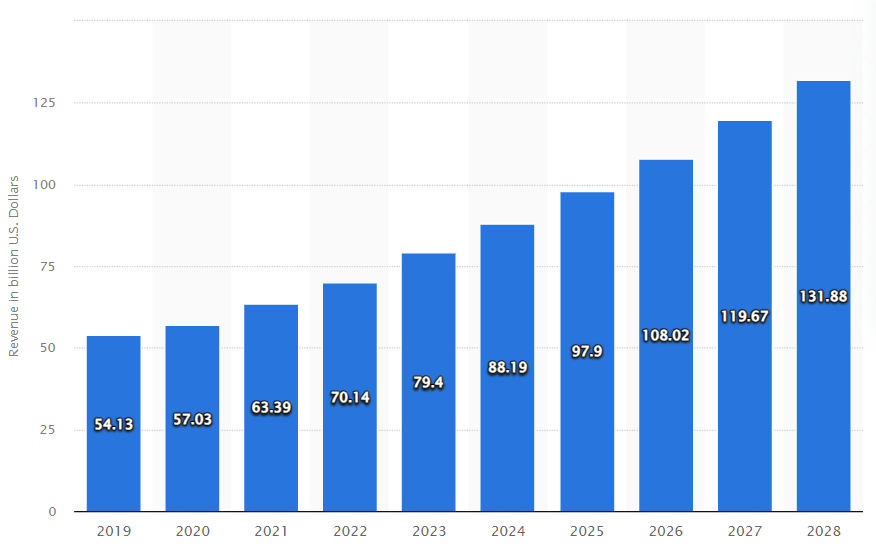When it comes to managing relationships with your business’s prospects and existing customers, a customer relationship management software, or CRM, is a must-have. In this day and age, it’s no secret that data is the key to meeting your company’s goals efficiently and effectively.
CRMs are at the heart of every growing business. In fact, CRM software is the biggest software market in the world, and the growth isn’t slowing down anytime soon. By 2028, CRMs are expected to reach more than $130 billion in revenue.

Revenue, in billions, of the CRM software market worldwide from 2019 to 2028 (Statista)
Every successful business utilizes a CRM to ensure that their strategies are based on relevant prospect, customer, and employee data. However, each business is different and has its own unique combination of obstacles and goals to consider. Just like a snowflake or a fingerprint, no two are the same.
Each business requires a different strategy from the next, which makes determining which CRM to use a battle in and of itself. When figuring out how a CRM will benefit your business, you need to compare the different options and see which of these best suits your goals.
This blog will help you identify the three main types of CRMs and what you should consider when deciding which is best for your business.
What are the 3 types of CRM software and what do they do?
1. Operational CRM
Operational CRM is the most traditional CRM subset. It maintains a record of direct interactions with clients and prospects. It’s based on data entries and helps organizations monitor sales and marketing activities.
2. Analytical CRM
Analytical CRMs mine data received from every level of the organization and provide insights and intelligence to help businesses operate effectively. When used for sales and marketing — its most common application — this CRM analyzes data from multiple sources, such as web forms, white paper downloads, and other portals to help profile prospects.
3. Collaborative CRM
A collaborative CRM is another CRM subset that helps coordinate activities between organizations working on joint projects. Its goal is to ensure that various organizations operate in a single orchestrated manner. Often, this entails communicating with vendors and documenting the logistics for any type of outsourced goods and services.
Just from these brief descriptions, it’s clear that each type of CRM is catered to handle different business processes. Understanding the functionality and individual capabilities of each type of CRM will allow you to develop a strategy that works specifically for your business.
Next, we’ll take a look at the specific functions of each type of CRM and how they can be incorporated into your business’s strategy to help you reach your goals.
Operational CRM
An operational CRM helps you manage your customer interactions and relationships. This type of CRM is especially helpful for people working within the realms of customer support, sales, marketing operations, order fulfillment, and more.
Operational CRMs will help you streamline your business’s processes through three main functions: service automation, sales automation, and marketing automation. In general, businesses with fairly linear sales processes or those trying to streamline workflows benefit the most from using an operational CRM.
Service Automation
Service automation allows you to create a positive experience for your customers with each customer service action that takes place. This type of automation ensures that your company is providing service that is precise and punctual.
Operational CRMs take into account many different aspects of the customer journey in order to create an accurate and fulfilling experience. Service automation collects the data from all customer emails, phone calls, real-time website activities, and orders you receive and consolidates them by presenting them as one final interface for your business.
This automation also helps determine the overall satisfaction of your customers. By allowing you to collect data on each individual action, service automation lets you find new ways for your customers to engage with your company.
Additionally, this tool can improve your company’s task delegation. With service automation, you can gain a better understanding of your customers’ needs while implementing strategies that increase the overall productivity of your company.
Sales Automation
Automating sales operations allows your team to execute sales tasks more efficiently and effectively. An operational sales team using automation is more likely to escape mishaps associated with tasks piling up overtime or being forgotten.
Sales automation also allows you to assign tasks based on data-driven characteristics including customer actions or the value of certain deals. This tool is especially useful because it allows you to see current workflows and enables you to understand where improvements can be made in order to reach your company’s current and future sales goals.
When thinking about how to automate your company’s sales process, be sure to consider the bigger picture. It’s important to understand the end goal and mission of your company before executing more precise strategies within each department. All of your smaller goals should align smoothly. Consider the entire consumer life cycle and how you can use sales automation techniques like email scheduling, phone documentation, and contact management to meet your goals.
Marketing Automation
Marketing automation helps you discover ways to market to prospects and leads. This operational CRM tool fills in the gap that often occurs between the moment a customer browses your website and the moment that customer actually speaks with the sales team.
This type of automation focuses on how to entice those within your circle that have yet to become a solid customer of your company. Through marketing automation, you are also able to score leads based on interest level, which can help you create a more successful and accurate prospect list.
Some of the most common ways to use marketing automation through an operational CRM include email marketing, lead nurturing, and campaign tracking over time. All of these aspects come together when developing a strategy for attracting loyal customers for your brand. The marketing automation function allows you to measure sales conversions and fine-tune your marketing processes.
Analytical CRM
So what is an analytical CRM? Unlike the other two CRM subsets, analytical CRMs provide a deeper level of intelligence, which is what its name implies. Its objective is to create an automated way to get more insight about what it predicts are your best opportunities. Most users of this type of CRM include data analysts, accountants, as well as business intelligence professionals.
For example, your database may hold 20,000 contacts, but at any given time, maybe only 5,000 of them are interacting with your marketing touch points (website, emails, white papers, social posts, etc.). Your sales reps could try randomly calling all 20,000 contacts, or you could systematically prioritize calls based on tools that rank leads who display “interested” patterns and purchase intent.
Below are some more ways you can utilize analytical CRM software to benefit your business’s overall strategy:
- Account Based Marketing: When you know the interests of an individual or organization, you have the ability to specifically address their needs. Email segmentation is one example of what account-based marketing can allow, which is why tracking touch points becomes important.
- Marketing Campaign Optimization: What are the most successful marketing campaigns and which are the biggest flops? In the past, we would have to manually conduct surveys and correlate sales by educated guesses. Using tracking info and CRM analytics, we can take the guesswork out of where to spend marketing dollars.
- Optimization of marketing and sales activity: While this is also a benefit of operational CRM, tracking software can provide analytic intelligence across different departments. Your sales and marketing teams can learn to further maximize time and resources by focusing on prospects most likely to be persuaded by their efforts.
- Knowledge on what motivates prospects to become customers: When you combine prospects’ demographic info with a record of their interests and marketing exposures, you can begin to get a picture of what motivates them to become a customer. If you analyze this data properly and apply what you learn to future endeavors, you will be able to convert more and more prospects.
- New sales opportunities: When you understand how your clients are connected and what motivates each target segment, you can see opportunities for up-sells and cross-sells. Plus, you can use these analytic CRM tools to be more timely and relevant. For example, if a client is prompted to view additional products on your site from an email, you could be notified to reach out and contact that person.
Analytical CRMs are crucial if your company is trying to leverage data to gain a deeper understanding of how customers operate and how likely they are to interact with your company. By using CRM analytical tools and data to identify key trends, you are able to gain insight on how to further develop your strategies in order to reach your business’s goals.
Collaborative CRM
A collaborative CRM allows a company’s marketing, sales, and various service departments to share customer information openly with one another in an accessible way. With this kind of CRM software, the goal is to promote company-wide harmony. Ultimately, a collaborative CRM software can be used to help each department understand how they fit in when fulfilling a customer’s wants and needs.
The cross-department sharing is done through two main ways: interaction and channel management. Both of these methods come together to help you understand the data that you collect throughout the different aspects of your company.
Interaction Management
Interaction management helps you track every single interaction that takes place between your company and your customers. The information gained from this tool allows you to keep a clear log of everything from emails and social media to phone calls and in-person interactions.
Channel Management
With channel management, you are able to take your collaborative CRM even further. You can use information that’s been previously gathered to improve your methods of communication with customers. This management tool allows you to cater your outreach strategy to fit the needs of your customers.
One thing to keep in mind when it comes to collaborative CRMs is that this software will only be useful if your customers are comfortable with sharing their information freely throughout the organization. A collaborative CRM is often used in businesses with multiple locations or companies that really benefit from an increase in synchronization efforts.
Finding the best fit for your business
Now that we’ve covered how each type of CRM software can benefit your business, it’s time to think about how your company’s goals and structure fit into the equation. When taking the next steps toward implementing a CRM software, think about the answers to these questions before deciding on which program to use:
- What do you like about your current CRM if you have one in place? What are you missing?
- What are you hoping to gain from implementing a new CRM software?
- Which CRM will integrate most with your existing technology?
- Which CRM will create the least amount of day-to-day work for your team?
- How does your current software strategy align with your business’s long-term goals?
The answers to these questions will help you make the best choice for your business and ultimately pave the organized, optimized path toward your company’s success!
Christie Calahan contributed to this blog.
SEE FOR YOURSELF
Watch an overview to learn how B2B marketing automation by Mirabel Technologies can help you increase traffic, optimize your funnel, drive more leads, improve conversions, and boost ROI — at a price you can afford!




